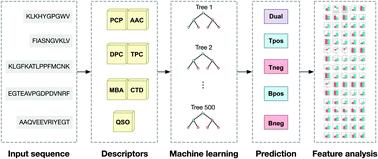当前位置:
X-MOL 学术
›
Mol. Biosyst.
›
论文详情
Our official English website, www.x-mol.net, welcomes your feedback! (Note: you will need to create a separate account there.)
Computational study on the origin of the cancer immunotherapeutic potential of B and T cell epitope peptides
Molecular BioSystems Pub Date : 2017-09-07 00:00:00 , DOI: 10.1039/c7mb00219j Hao Li 1, 2, 3, 4, 5 , Nalini Schaduangrat 1, 2, 3, 4, 5 , Saw Simeon 1, 2, 3, 4, 5 , Chanin Nantasenamat 1, 2, 3, 4, 5
Molecular BioSystems Pub Date : 2017-09-07 00:00:00 , DOI: 10.1039/c7mb00219j Hao Li 1, 2, 3, 4, 5 , Nalini Schaduangrat 1, 2, 3, 4, 5 , Saw Simeon 1, 2, 3, 4, 5 , Chanin Nantasenamat 1, 2, 3, 4, 5
Affiliation

|
Immune therapy is generally seen as the future of cancer treatment. The discovery of tumor-associated antigens and cytotoxic T lymphocyte epitope peptides spurned intensive research into effective peptide-based cancer vaccines. One of the major obstacles hindering the development of peptide-based cancer vaccines is the lack of humoral response induction. As of now, very limited work has been performed to identify epitope peptides capable of inducing both cellular and humoral anticancer responses. In addition, no research has been carried out to analyze the structure and properties of peptides responsible for such immunological activities. This study utilizes a machine learning method together with interpretable descriptors in an attempt to identify parameters determining the immunotherapeutic activity of cancer epitope peptides.
中文翻译:

B和T细胞表位肽的癌症免疫治疗潜力来源的计算研究
免疫治疗通常被视为癌症治疗的未来。肿瘤相关抗原和细胞毒性T淋巴细胞抗原决定簇肽的发现促使人们对基于肽的有效癌症疫苗进行了深入研究。阻碍开发基于肽的癌症疫苗的主要障碍之一是缺乏体液反应诱导。到目前为止,已经进行了非常有限的工作来鉴定能够诱导细胞和体液抗癌反应的表位肽。另外,还没有进行研究来分析负责这种免疫活性的肽的结构和性质。这项研究利用机器学习方法和可解释的描述符,以尝试确定确定癌症表位肽的免疫治疗活性的参数。
更新日期:2017-09-07
中文翻译:

B和T细胞表位肽的癌症免疫治疗潜力来源的计算研究
免疫治疗通常被视为癌症治疗的未来。肿瘤相关抗原和细胞毒性T淋巴细胞抗原决定簇肽的发现促使人们对基于肽的有效癌症疫苗进行了深入研究。阻碍开发基于肽的癌症疫苗的主要障碍之一是缺乏体液反应诱导。到目前为止,已经进行了非常有限的工作来鉴定能够诱导细胞和体液抗癌反应的表位肽。另外,还没有进行研究来分析负责这种免疫活性的肽的结构和性质。这项研究利用机器学习方法和可解释的描述符,以尝试确定确定癌症表位肽的免疫治疗活性的参数。


























 京公网安备 11010802027423号
京公网安备 11010802027423号